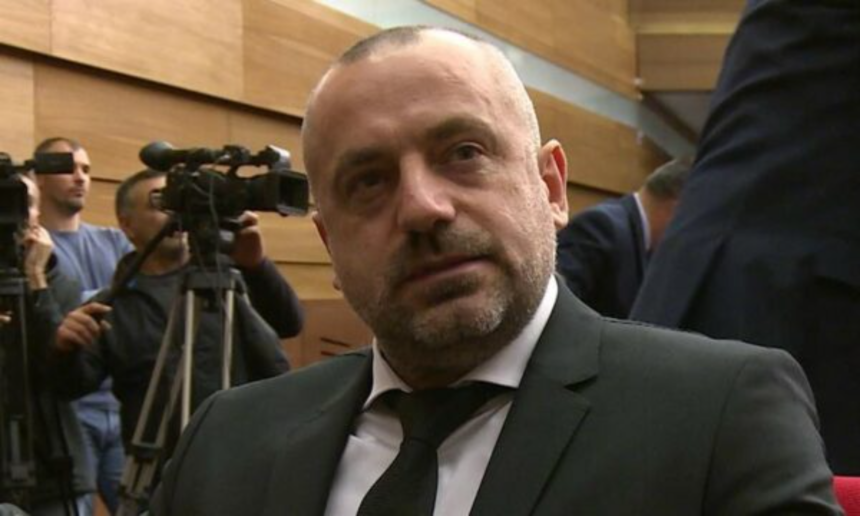For Kosovo, former Serbian politician Milan Radoičić remains at the heart of security issues. For over a year, his name has been associated with accusations of being a “criminal,” “terrorist,” and “smuggler,” and is frequently mentioned in both official and verbal accusations regarding orchestrating attacks in Kosovo.
“All the attacks that have occurred, and the future attacks they plan to carry out, would drastically decrease if Milan Radoičić were handed over to the institutions of Kosovo, the police, and the judiciary,” said Kosovo Prime Minister Albin Kurti.
He made this statement after the November 29 attack on the Ibër-Lepenc canal, which provides water to several cities and power plants in the country. Kurti implicated Radoičić and the Serbian state in the organization of the attack, though Serbian leadership denied any responsibility.
Radoičić is also under indictment in Kosovo for his involvement in the armed attack in Banjska, which charges him with terrorism. He is subject to an arrest warrant.
What is known is that he is located in Serbia, at least according to authorities there. Following the Ibër-Lepenc attack, Kurti called on the international community to pressure Belgrade to extradite Radoičić to Kosovo.
“In Kosovo, there is the rule of law. Our courts are far superior to those in Serbia. This is stated in international reports as well,” Kurti said.
Radio Free Europe was unable to get a response from Kosovo’s government regarding whether any guarantees have been received from the international community. Likewise, the U.S. Department of State and the European Union did not respond to RFE’s inquiry regarding how they will proceed after Kurti’s call.
Augustin Palokaj, a journalist who has followed European politics for years, says that the chances of Radoičić being handed over to Kosovo are unrealistic.
“This request or demand from the Prime Minister of Kosovo seems logical and reasonable because Serbia is not taking any action,” Palokaj said.
“However, Serbia does not extradite anyone to another country, so the EU has an understanding for all countries in the region that do not extradite their nationals to other countries, except for international judicial structures,” Palokaj added.
Toby Vogel, from the Council for the Policies of Democratization in Berlin, said that now is the time for the EU to apply pressure on Serbian President Aleksandar Vučić to take action against Radoičić, before the elected U.S. President Donald Trump takes office in January.
Vogel believes that this pressure should come from the EU, as Trump’s return is not expected to bring anything positive for the Western Balkans.
“If there is to be pressure for Radoičić’s extradition, it is difficult to say, considering the complicated relations between Kosovo and Serbia. It is not uncommon for states not to extradite their nationals. However, the current U.S. administration, under President Joe Biden, and the EU should make it clear to Vučić that it is intolerable for Radoičić to remain free in Serbia,” Vogel said.
Serbia is also conducting its own investigations against Radoičić, who has admitted responsibility for the September 2023 Banjska attack.
One Kosovo police officer was killed in the attack, while three Serbian attackers were also killed in the ensuing firefight.
The Chief Prosecutor of the High Public Prosecutor’s Office in Belgrade, Nenad Stefanović, said earlier this month that a decision to indict Radoičić will be made by the end of this year or in early 2025.
In Serbia, Radoičić is suspected of other criminal offenses, including “serious crimes against public security and the production, possession, and illegal trafficking of weapons.”
After the October 2023 hearing in Belgrade, Radoičić was released, but was asked not to leave Serbia and to report to the police station twice a month.
The High Court in Belgrade confirmed that this measure was extended until January 2025, and that Radoičić is “complying.”
It is unclear where exactly Radoičić is located in Serbia. The Serbian Ministry of Internal Affairs did not respond to RFE’s inquiry regarding which police station he reports to. RFE’s calls to Radoičić’s lawyer, Goran Petronijević, also went unanswered.
Another Serbian lawyer, Božo Prelević, said that the High Prosecutor’s decision could either lead to an indictment against Radoičić or result in no indictment at all.
“The decision is usually made after analyzing the evidence. Since this case is closed to the public, we do not know what evidence the prosecutor has, nor do we know who has been heard,” Prelević said.
The Serbian Prosecutor’s Office did not respond to RFE’s questions regarding what its investigation has revealed or what actions have been taken.
However, the announcement about a decision was made during a period when the EU is expected to decide whether to unblock Serbia’s EU membership talks.
Palokaj says the EU will likely link these two issues, but he believes there will be no tangible result in practice, because:
“There are member states in the EU [like Hungary], and even in NATO, that are not interested in exposing Serbia’s role in Banjska, because if the EU classifies this attack as terrorist, and if it is proven that Serbia supports such actions, then Serbia would have to be treated as a state that sponsors terrorism.”
“Some EU countries and the U.S. are not interested in such a thing,” Palokaj added.
Palokaj also stated that unofficially, the EU acknowledges that it knows exactly who is responsible for the Banjska attack and that their actions have already been proven.
He said that the EU, in principle, expects those responsible to be arrested and tried in Serbia, but this will not happen if Serbia sees no consequences from inaction.
This situation will undoubtedly also reflect in the dialogue for the normalization of relations with Serbia, as Kurti has conditioned his participation in this process on the extradition of Radoičić.
“I fear that the region is entering a period of great instability, primarily because of the incoming Trump administration,” Vogel said.
“The EU must act, and it must act now. There must be a completely new approach to the dialogue. I believe that the new EU foreign policy chief, Kaja Kallas, and the Enlargement Commissioner, Marta Kos, are aware of this,” he added.
In a meeting with Kallas on December 3, Kurti said that he has not given up on Radoičić’s extradition as one of the conditions for continuing the dialogue for the normalization of relations with Serbia.
The day after, in a meeting with U.S. Assistant Secretary of State James O’Brien, Kurti also discussed the importance of Radoičić’s arrest, stating that he has the support of Serbian President Vučić and the Serbian state apparatus.
At a forum in late June, O’Brien said that Serbia had promised Radoičić would face the law in relation to the Banjska attack.
Earlier, through the EU’s rule of law mission in Kosovo, EULEX, Serbia requested information from Kosovo about Banjska, but Kosovo refused this request.
This week, Kosovo’s Interior Minister Xhelal Sveçla also spoke on the issue:
“There are two different things when it is said that we should give Serbia the evidence we have, and then they organize a farce – pretending to judge Radoičić – and it is another thing for Radoičić to be handed over to us through EULEX.”
“We cooperate closely with EULEX, and we would certainly be willing to use that opportunity for Radoičić to be brought to justice in the Republic of Kosovo,” Sveçla said.
Radoičić has been under sanctions from the U.S. and the U.K. for years due to suspected corruption and organized crime.
In Kosovo, he is also suspected of several other criminal acts, including the murder of Serbian politician Oliver Ivanović.
The final resolution, it seems, will entirely depend on the willingness of the involved parties to engage constructively in the pursuit of justice and stability. However, until such a solution is reached, which is often within arm’s reach, it may take years to come. /REL







